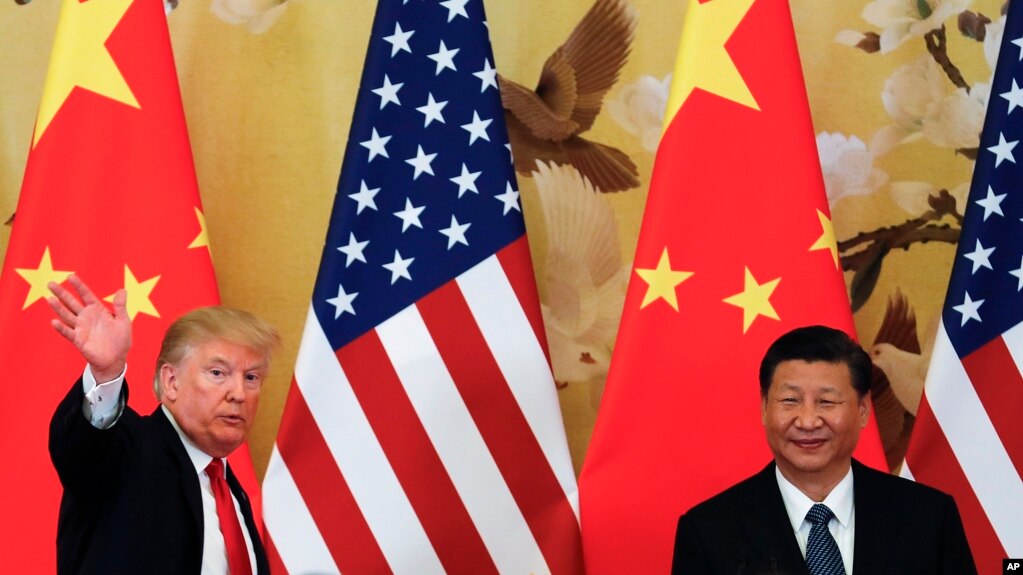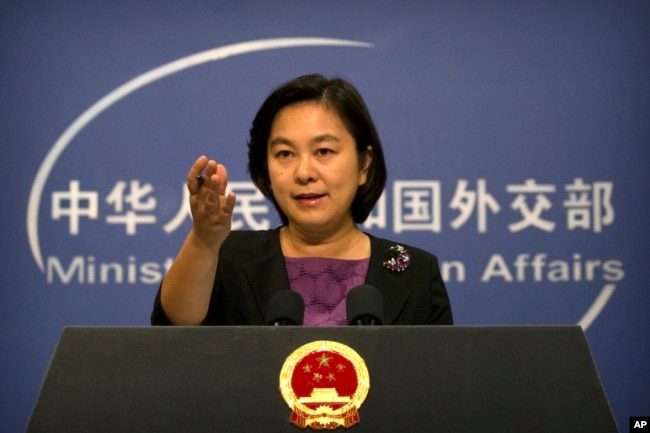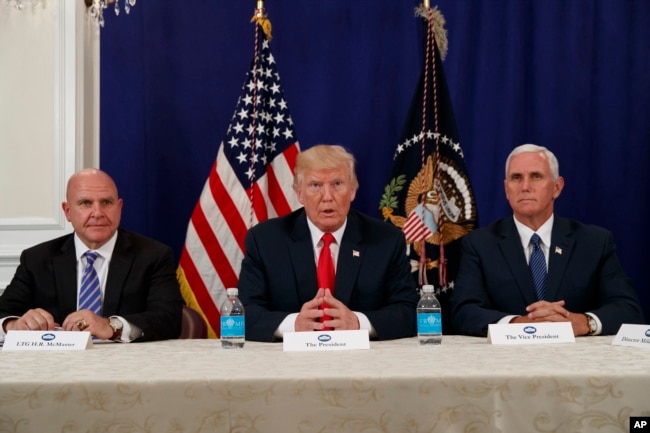
BEIJING —
Beijing has rejected criticisms outlined in President Donald Trump’s national security strategy report, a document that lists China as a strategic competitor and challenge to American values.
The outline of the Trump administration’s national security concerns and plans, is critical of the ambitions of China’s Communist Party leaders, accusing them of seeking to spread the features of the country’s authoritarian system, stealing intellectual property and expanding the reach of its state-led economic model.
The report lists three sets of challengers to peace and American values. In addition to Iran, North Korea, and terrorist groups, China and Russia are listed as “revisionist powers” that want to shape the world with different values and interests.
“These are fundamentally political contests between those who favor repressive systems and those who favor free societies,” the report said.
The report also accuses China of challenging international norms, and expresses concern that decades of effort by the United States to allow China time to integrate in the international order and liberalize have failed.
“Contrary to our hopes, China expanded its power at the expense of the sovereignty of others. China gathers and exploits data on an unrivaled scale and spreads features of its authoritarian system, including corruption and the use of surveillance,” the report said.
The report lists three sets of challengers to peace and American values. In addition to Iran, North Korea, and terrorist groups, China and Russia are listed as “revisionist powers” that want to shape the world with different values and interests.
“These are fundamentally political contests between those who favor repressive systems and those who favor free societies,” the report said.
The report also accuses China of challenging international norms, and expresses concern that decades of effort by the United States to allow China time to integrate in the international order and liberalize have failed.
“Contrary to our hopes, China expanded its power at the expense of the sovereignty of others. China gathers and exploits data on an unrivaled scale and spreads features of its authoritarian system, including corruption and the use of surveillance,” the report said.
Speaking at a regular press briefing Tuesday, China’s Foreign Ministry spokeswoman Hua Chunying called the report’s characterization of China a “futile effort to distort reality”.
“The people of China have full confidence in the development path of socialism with Chinese characteristics that they have chosen,” Hua said, noting that the country accounts for more than 30 percent of the world’s economic growth.
She also said the United States and China, as the world’s two biggest economies have a responsibility to work together.
“Cooperation is the only correct choice for the U.S. and China, a win-win approach will lead to a better future,” Hua said.
Beijing’s response and state media have been somewhat muted in their coverage of the report, trying to focus largely on a positive way forward and the risks of rocking the status-quo.
Online, few seemed surprised. As one put it, “Of course the U.S.’s biggest strategic enemies are China and Russia; this is an open secret, it’s just that filter-less Trump is directly speaking that out loud."
Others called attention to the difference between competitor and enemy, or as the Foreign Ministry did, calling for cooperation. Some said competition was a good thing, “No competition means no progress, this is how it is between countries!"
Some state media articles have argued it is unlikely Trump will follow through and take action to address the concerns raised in the report.
Analysts who VOA spoke with, however, said the release of the document marks the beginning of a colder period in relations.
“To me it is cold peace, we are not going to war, the tensions are there, the contradictions are there and even more than competition is the power rivalry is there,” said Hong Kong Baptist University Professor Jean-Pierre Cabestan.
“Reading the report, you feel that the U.S. is worried that this may be the end of American supremacy in a number of areas, but also the fact that the liberal view of economic development, international relations is not working, that China is not becoming more liberal,” Cabestan said.
Alexander Huang, a strategic studies professor at Taiwan’s Tamkang University said the report makes it clear that while China and the United States can compete, infringement of intellectual property and theft of such technologies will no longer be tolerated.
“The Trump approach to China will be more forceful, more eye to eye,” Huang said. “I think Trump and his company believe that China has been taking advantage of an open economy and taking advantage of free trade to promote its own nationalistic economic growth.”
William Choong, a senior fellow with the International Institute for Strategic Studies in Singapore, said the report could mark the beginning of colder phase in relations, but Trump continues to be someone who is hard to predict.
“One should look beyond what he is saying and see what Washington is actually doing on the ground in the Asia Pacific,” Choong said.
One key thing that the report brings up, Choong said is the emphasis on rule of law. He said while the term has been bandied about for quite some time it is likely to be a key focus with China going forward, be it disputes in the South China Sea or economic differences.
“Essentially they are going to talk about principles and how reasonable states adhere to such principles and the Chinese are already very irritated by this approach and the values because it is an approach that is shared and advocated by four major powers in the Pacific - the U.S., Japan, India and Australia,” Choong said.
“To me it is cold peace, we are not going to war, the tensions are there, the contradictions are there and even more than competition is the power rivalry is there,” said Hong Kong Baptist University Professor Jean-Pierre Cabestan.
“Reading the report, you feel that the U.S. is worried that this may be the end of American supremacy in a number of areas, but also the fact that the liberal view of economic development, international relations is not working, that China is not becoming more liberal,” Cabestan said.
Alexander Huang, a strategic studies professor at Taiwan’s Tamkang University said the report makes it clear that while China and the United States can compete, infringement of intellectual property and theft of such technologies will no longer be tolerated.
“The Trump approach to China will be more forceful, more eye to eye,” Huang said. “I think Trump and his company believe that China has been taking advantage of an open economy and taking advantage of free trade to promote its own nationalistic economic growth.”
William Choong, a senior fellow with the International Institute for Strategic Studies in Singapore, said the report could mark the beginning of colder phase in relations, but Trump continues to be someone who is hard to predict.
“One should look beyond what he is saying and see what Washington is actually doing on the ground in the Asia Pacific,” Choong said.
One key thing that the report brings up, Choong said is the emphasis on rule of law. He said while the term has been bandied about for quite some time it is likely to be a key focus with China going forward, be it disputes in the South China Sea or economic differences.
“Essentially they are going to talk about principles and how reasonable states adhere to such principles and the Chinese are already very irritated by this approach and the values because it is an approach that is shared and advocated by four major powers in the Pacific - the U.S., Japan, India and Australia,” Choong said.






















0 comments:
Post a Comment